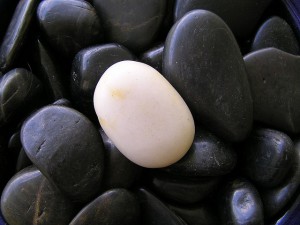
(Photo courtesy of Cyron at Flickr, CC License.)
Together with my students at a language course, I recently found a great way of activating det passive ordforråd (the passive vocabulary). I wrote a simple word on tavlen (the blackboard), asking my students to find its modsætning (opposite). Then we picked another word, found its ”opposite”, and the game went on and on and on… The students were surprised how many words they knew! 🙂
Let’s play this game here on the blog. I’ll add only one translation, the other you’ll have to add in your mind!
god (good) – dårlig
sulten (hungry) – mæt
tom (empty) – fuld
fuld (drunk) – ædru
lille (small) – stor
dag (day) – nat
kvinde (woman) – mand
mørk (dark) – lys
hvid (white) – sort
her (here) – der
trist (sad) – glad
tung (heavy) – let
let (easy) – svær
ude (outside) – inde
land (countryside) – by
ung (young) – gammel
tynd (thin) – tyk
at græde (to weep) – at grine
sund (healthy) – usund
fjende (enemy) – ven
krig (war) – fred
had (hate) – kærlighed
spørgsmål (question) – svar
klog (knowledgeable) – dum
bjerg (mountain) – dal
syg (ill) – rask
farlig (dangerous) – tryg
smuk (beautiful) – grim
kedelig (boring) – sjov
at huske (to remember) – at glemme
…
Now, that isn’t too svær, is it? 🙂 Many words have a ”twin” or a ”partner” that somehow is linked to it without being an actual opposite. Take for instance
hund (dog) – kat
at spise (to eat) – at drikke
at skynde sig (to hurry) – at vente
Do you agree with those? What are the opposites or ”partners” of
is (ice)
hav (sea)
ansigt (face)
fod (foot)
stilhed (silence)
kød (meat)
at smile (to smile)
at snakke (to talk)
blå (blue)
regn (rain)
?
Sometimes, words seem to come in sets of 3 or 4: far, mor, børn (dad, mum, kids) – sol, måne, stjerne (sun, moon, star) – nord, syd, øst, vest (N, S, E, W) – øre, næse, øje, mund (ear, nose, eye, mouth). Maybe we could ”gamify” those sets as well…





